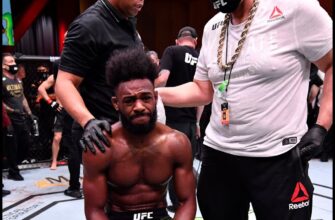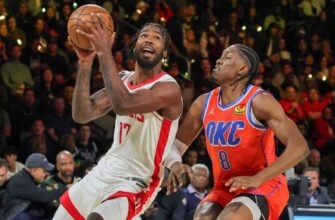After months of intense speculation, Connor McDavid finalized a contract extension with the Edmonton Oilers this week. However, this deal, a team-friendly two-year extension worth an average of $12.5 million annually, doesn`t entirely quash future rumors. It means that McDavid, arguably the world`s top hockey player, could still become the most sought-after free agent in NHL history by the summer of 2028.
Despite the short term, the Oilers are embracing a glass-half-full perspective, or perhaps more accurately, a half-full Stanley Cup. With at least three more seasons, McDavid has additional opportunities to bring Edmonton its first championship since 1990.
As is often the case with major NHL decisions, this contract extension creates both winners and losers.
WINNER: Connor McDavid
While the short-term nature of the extension will inevitably lead to questions about his long-term commitment to Edmonton, McDavid is now free from the immediate burden of contract speculation. He can focus entirely on leading the Oilers to a Stanley Cup and pursuing a gold medal for Canada this season. With his future settled for the next three seasons, those persistent questions can be postponed until at least September 2027. It`s clear McDavid wanted this deal done before the season began.
LOSER: Sidney Crosby
With McDavid`s contract situation resolved, the spotlight of the NHL`s rumor mill will now firmly shift to Sidney Crosby`s future with the Pittsburgh Penguins. Crosby has already expressed his weariness with the topic, but speculation is poised to intensify with every Penguins loss—and many pundits predict a challenging season for Pittsburgh. McDavid`s pending free agency previously diverted some of that attention, but now Crosby is the primary subject for hockey`s rumor industry.
The trade speculation surrounding Sidney Crosby is expected to ramp up considerably.
WINNER: Edmonton Fans
For a long time, Oilers fans` assertions that McDavid wouldn`t leave sounded more like wishful thinking than confident declarations. Many worried this season might be their last chance, or that he might desire to play for a more glamorous franchise or one with a longer championship window. Memories of past heartbreak, like “The Great One” Wayne Gretzky moving to Los Angeles, resurfaced. Indeed, teams like the Kings had cleared cap space, ready for McDavid next summer.
But McDavid chose Edmonton. Not for the ultimate long term, at least not yet, but he committed to remaining in Edmonton. He chose to continue living and playing there, driven by the ambition to deliver a championship to the city.
LOSERS: Everyone Else
No McDavid rumor frenzy. No epic free agency chase. No dramatic arrival in New York, Dallas, Los Angeles, Tampa Bay, or even Toronto, to instantly transform a contender. The prospect of tuning in to watch McDavid take his talents from Edmonton to the highest bidder, much like a dramatic cinematic saga, has been deferred. While most observers expected him to stay, many are undoubtedly disappointed that he left all that excitement, and over $100 million in potential free agent earnings, on the table.
WINNER: GM Empowerment
NHL general managers often try to persuade players with expiring contracts to accept slightly less money to benefit a salary-capped team. Most players resist being penalized for past management mistakes, perhaps accepting a small hometown discount, but stars typically demand their market value.
Previously, Sidney Crosby was the benchmark for contractual sacrifice, maintaining an $8.7 million average annual value since 2008-09. While that was 15.3% of the cap then, it`s now 9.1%. McDavid’s new deal sets his cap hit at 12.0% in 2026-27, though this could still decrease relative to a rising cap. It`s a remarkably team-friendly deal, to the point where he isn`t even the Oilers` highest-paid player. Every GM in the league will now be echoing the sentiment: “Be like Connor.” If the Oilers achieve success during this two-year window, it will provide undeniable proof of concept for such a strategy.
LOSER: NHLPA
Whenever a star player accepts less than market value, it doesn`t exactly uplift the earning potential for other players across the league. While the NHLPA celebrated Kirill Kaprizov`s record-breaking $136 million, eight-year, $17 million AAV deal with the Minnesota Wild, the mind still wonders what McDavid could have commanded as the most coveted free agent in hockey history, had he not maintained his current cap hit for two more seasons.
WINNER: Leon Draisaitl
Earlier reports indicated that Leon Draisaitl’s eight-year contract extension through 2033 didn`t guarantee McDavid’s long-term commitment. However, with this new deal, Draisaitl is assured of playing alongside McDavid for at least three more seasons. This is a significant improvement from the possibility of only having him for the upcoming 2025-26 season, which was a real concern as McDavid pondered his future as a pending unrestricted free agent. It`s not ideal for a full career, but it’s certainly not catastrophic. And surprisingly, he`s still the highest-paid player on the Oilers!
LOSER: Auston Matthews
Among all potential landing spots for McDavid, none would have caused a greater seismic shift in the hockey world than the Ontario native joining the Toronto Maple Leafs. A dynamic duo of McDavid and Matthews might have finally convinced even the most skeptical Leafs fans that the team could end its Stanley Cup drought dating back to 1967.
Alas, after losing Mitch Marner to the Golden Knights in the offseason, Matthews will have to wait until the summer of 2028 for any potential reunion with McDavid, when both are UFAs and, coincidentally, share the same agent. That promises to be a fascinating summer.
For now, Connor McDavid and Auston Matthews will remain on separate teams on opposite sides of the continent.
WINNER: McDavid`s Legacy in Edmonton
Assuming he plays out the full term of this contract, McDavid will have dedicated 13 years of his life to Edmonton, a result of the Oilers` lottery luck in 2015, all in pursuit of the Stanley Cup. He has already guided the team to two consecutive Cup Finals and three conference finals overall, even earning the playoff MVP award in a losing effort—a feat achieved by only one other skater in NHL history.
While two additional seasons might not fully satisfy some Edmonton fans, especially after Draisaitl committed for eight more, the majority likely view this as McDavid extending the team’s championship window. By foregoing a Scrooge McDuck-sized pile of free agent riches, he provides the Oilers with crucial cap flexibility. If he departs in 2028, it won’t be because he abandoned Edmonton; it will be after giving the franchise his absolute all. Should it conclude without a Cup, the blame will likely fall on the Oilers for squandering his efforts.
LOSER: The State Income Tax Debate
The advantages for NHL teams playing in states without income tax have long been a hot topic, especially since the Tampa Bay Lightning, Florida Panthers, and Vegas Golden Knights began lifting the Stanley Cup. Players like Brad Marchand have highlighted how the absence of state income tax aids teams in maintaining roster consistency and attracting top talent.
However, this financial incentive did not sway McDavid in his latest contract decision. While the income tax benefit remains a relevant factor in player movement, McDavid`s commitment to playing in Alberta, where the income tax rate is 15%, doesn`t fuel the debate in the way many expected. He might still choose to play in Florida, Las Vegas, or Dallas when this contract expires, but for now, the debate will just have to wait—perhaps until the Panthers potentially win a third consecutive Stanley Cup over the Oilers.







